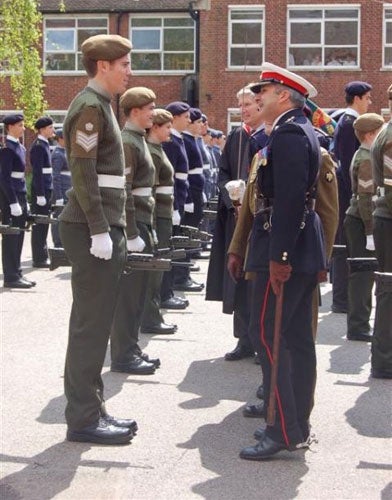Private schools will let state pupils join cadet forces

A ground-breaking agreement to allow state school pupils to join cadet forces in some of Britain's most elite private schools is to be announced this month. Six of the country's top fee-paying schools – including City of London boys' school and Highgate – have agreed to open up their Combined Cadet Forces to neighbouring state schools.
The move is designed to give more pupils a taste of army life and follows a call from the Prime Minister, Gordon Brown, for more state schools to set up their own army corps to give their pupils more of a sense of discipline. All six schools involved in the first tranche are in London, but the scheme will be extended nationwide if successful.
The plan will be unveiled at the annual meeting of the Headmasters' and Headmistresses' Conference – which represents 250 of the country's most elite independent schools – at the end of the month.
The Schools minister, Lord Adonis, told a conference at Brunel University in west London yesterday: "This is a highly innovative programme which could be extended. It is the private schools sharing their expertise with the state sector."
At present, 200 private schools have CCF schemes, but only 60 state schools run them. In all, 42,000 pupils take part in cadet activities.
The agreement comes at a time when independent schools are under immense pressure from the Charity Commission to share their facilities with their state sector counterparts to justify their charitable status.
But critics have complained that youngsters should not be placed under pressure to join the army corps. David Gee, the author of a recent report by the Rowntree Foundation on army recruitment, said: "What school pupils have been telling me is they don't want their schools used for a government agenda of this kind. It's not an appropriate use of schools."
However, Lord Adonis said the argument was "totally spurious". He added: "It will only be done on the basis of willing schools, willing teachers and willing students. We're not seeking to impose cadet forces on any school that doesn't want one. There is a long waiting list of state schools that want cadet forces, for which there is no funding. There are not resources available. A large number of state schools want to take advantage of this initiative."
This year, a review commissioned by the Prime Minister and carried out by the Labour MP Quentin Davies recommended the setting up of cadet corps in state schools. Mr Davies said he did not see the cadet corps as training grounds for the military. "This is purposeful activity for young people," he said.
Under the deal, children from a state school would take part in cadet activities on a private school's grounds – raising the prospect of state school pupils learning the art of preparing for battle on the playing fields of Eton.
Meanwhile, Lord Adonis revealed that he had written to the heads of primary schools, urging them to select their brightest and most talented pupils for university "master classes" to stretch their talents after figures showed that about a quarter (4,000) had not joined the Government's "gifted and talented" programme – while almost all secondary schools (94 per cent) had.
Join our commenting forum
Join thought-provoking conversations, follow other Independent readers and see their replies
Comments
Bookmark popover
Removed from bookmarks